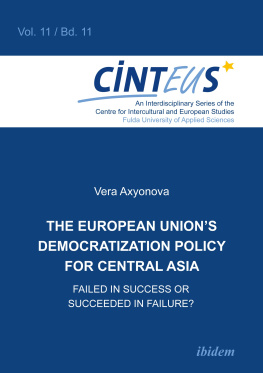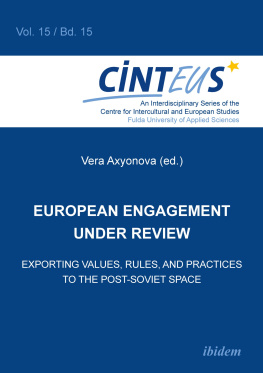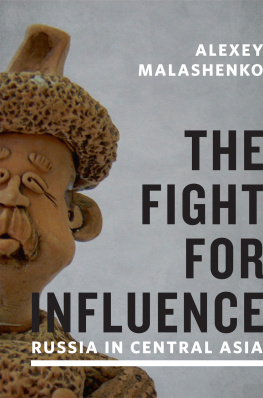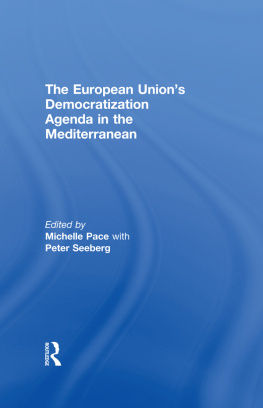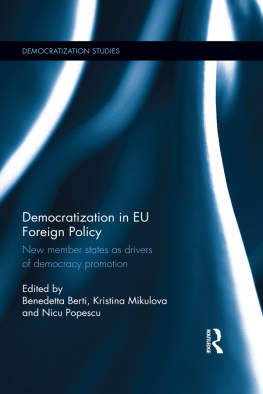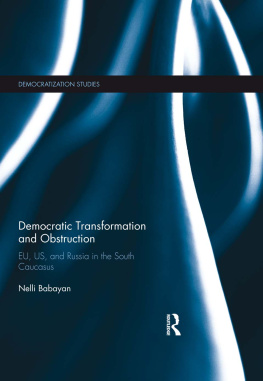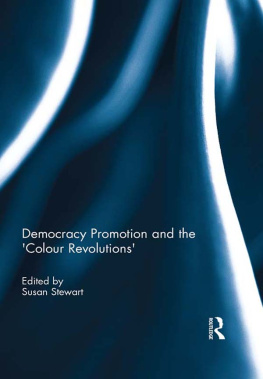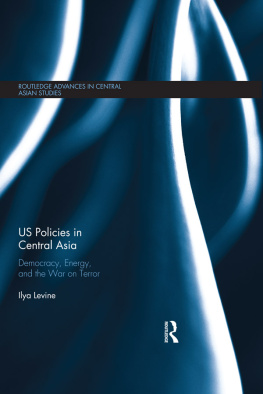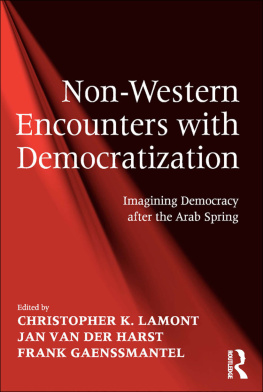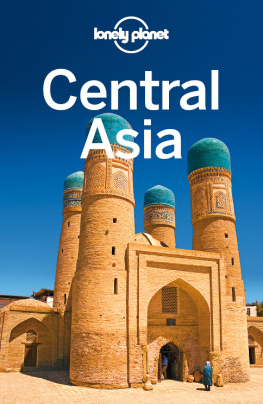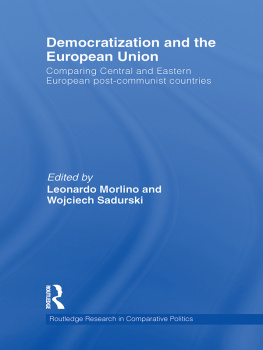ibidem Press, Stuttgart
For Ludmila, Viktor and Bjrn
Editorial
This series is intended as a publication panel of the Centre of Intercultural and European Studies (CINTEUS) at Fulda University of Applied Sciences. The series aims at making research results, anthologies, conference rea d ers, study books and selected qualification theses accessible to the general public. It comprises of scientific and interdisciplinary works on inter- and transculturality; the European Union from an interior and a global perspe c tive; and problems of social welfare and social law in Europe. Each of these are fields of research and teaching in the Social- and Cultural Studies Fa c ulty at Fulda University of Applied Sciences and its Centre for Intercultural and European Studies. We also invite contributions from outside the faculty that share and enrich our research.
Gudrun Hentges, Volker Hinnenkamp, Anne Honer & Hans-Wolfgang Platzer
Editorial
Die Buchreihe versteht sich als Publikationsforum des Centrums fr inter kulturelle und europische Studien (CINTEUS) der Hochschule Fulda. Ziel der CINTEUS-Reihe ist es, Forschungsergebnisse, Anthologien, Kongress reader, Studienbcher und ausgewhlte Qualifikationsarbeiten einer int e res sierten ffentlichkeit zugnglich zu machen. Die Reihe umfasst fachwi s sen schaft liche und interdisziplinre Arbeiten aus den Bereichen Inter- und Transkulturalitt, Europische Union aus Binnen- und globaler Perspektive sowie wohlfahrtsstaatliche und sozialrechtliche Probleme Europas. All dies sind Fachgebiete, die im Fachbereich Sozial- und Kulturwissenschaften der Hochschule Fulda University of Applied Sciences und dem angegliederten Centrum fr interkulturelle und Europastudien gelehrt und erforscht werden. Ausdrcklich ein geladen an der Publikationsreihe mitzuwirken sind auch solche Studien, die nicht im Hause entstanden sind, aber CINTEUS-Schwerpunkte berhren und bereichern.
Gudrun Hentges, Volker Hinnenkamp, Anne Honer & Hans-Wolfgang Platzer
Foreword
Over the last decade, the role of the European Union as an external demo c racy promoter has attracted an increased scholarly attention. The major part of the literature has so far centred on democratization effects of the EU enlargement processes and the EUs political engagement in the European neighbourhood. Fewer authors have looked at the EUs democracy and human rights promotion in regions beyond its immediate sphere of infl u ence. Vera Axyonovas study of the European Unions democratization pol i cy for Central Asia is a rare example of a systematic and very detailed i n vestigation of the EUs attempts to advance its normative agenda in this post-soviet region.
This book, based on Axyonovas PhD dissertation, presents the results of a thorough years-long research. Being aware of external and domestic co n straints for the EUs democratization policy in Central Asia, the author f o cuses on scrutinizing micro-level effects of the EU engagement and e x plaining conditions and reasons for varying outcomes of the EU efforts . To this end, she provides an in-depth analysis of specific EU democratization instruments in two Central Asian countries featuring different degrees of a u tocratization. Axyonova particularly traces the application of EU sanctions against Uzbekistan, examines the EUs bilateral human rights dialogues with Kyrgyzstan and Uzbekistan, and analyses the implementation of Eur o pean civil society support programmes in the two countries.
The author uncovers crucial information through her recurrent field research and multiple expert interviews conducted in Europe and Central Asia. A reader is puzzled by peculiar facts about the role of Germany in the process of sanctions enforcement, low expectations of EU officials concerning the human rights dialogues, and negotiations about financial support between the European Commission and the Uzbek government. These insights, dil i gent investigation, and well-structured argument ation linking the study of EU democratization instruments and their effects to the research of the substance of external democracy promotion constitute the main added va l ue of Axyonovas study .
Prof. Dr. Hans-Wolfgang Platzer
Acknowledgements
First of all, I would like to use this opportun ity to thank my PhD supervisors Prof. Dr. Matthijs Bogaards, Prof. em . Dr. Dr. h. c. Beate Kohler and Prof. Dr. Marlene Laruelle for their advice, encouragement and patience. Their guidance throughout the whole process was essential to the successful completion of this research. I am also very grateful to the Bremen Intern a tional Graduate School of Social Sciences for providing an excellent ac a demic environment and financial support for pursuing my PhD research. It was equally a privilege and a challenge to be part of the programme with such a high density of outstanding young scholars.
Further, I wish to express my gratitude to the Centre for European Policy Studies, and specifically to Dr. Michael Emerson, whose comments and a d vice have been an incredible source of inspiration. My research stay at CEPS was an extremely enriching experience and an exceptional oppo r tunity to conduct field work in Brussels.
A special note of thanks is devoted to the Centre for Intercultural and Eur o pean Studies at Fulda University of Applied Sciences, and particularly to Prof. Dr. Hans-Wolfgang Platzer for his support and making this publication possible.
I also would like to express my great appreciation to everyone who provided valuable feedback on various aspects and at different stages of my r e search. To Prof. Dr. Ulrike Liebert, PD Dr. Heiko Pleines, Dr. Janna Wolff, Dr. Arndt Wonka, Dr. Herwig Re iter, Prof. Dr. Rainer Baumann, Dr. Nate Breznau , special thanks to my colleagues from Europe-Central Asia Mon i toring programme Jos Boonstra and Tika Tsertsvadze , and all those , whom I cannot mention here by name for space reasons. I am equally grateful to all my interview partners from various organizations and institutions in E u rope and Central Asia. Without their insights and expertis e this research would not have been possible.
Finally, I would like to thank my family for their unconditional support and encouragement. As a sign of my appreciation, this book is dedicated to my parents Ludmila and Viktor and my husband Bjrn .
Vera Axyonova
January 2014
Abbreviations
AAP Annual Action Programme
AF Action Fiche
AIDCO EuropeAid Co-o peration Office
CBSS Country-Based Support Schemes
CIDA Canadian International Development Agency
CIS Commonwealth of Independent States
CSO Civil society organization
DANIDA Danish International Development Agency
DCI Development Cooperation Instrument
DG DEVCO Directorate-General Development and Cooperation
EuropeAid
DG RELEX Directorate-General for External Relations
EC European Community
EEAS European External Action Service
EIDHR European Instrument for Democracy and Human Rights
ENP European Neighbourhood Policy
EU European Union
EUSR European Union Special Representative
GIZ Deutsche Gesel lschaft fr Internationale Zusammena r beit
GONGO Government-organized non-governmental organization
HR Human rights
HRD Human rights dialogue
IBPP Institution Building and Partnership Programme
ICRC International Committee of the Red Cross
IP Indicative Programme
ISAF International Security Assistance Force

